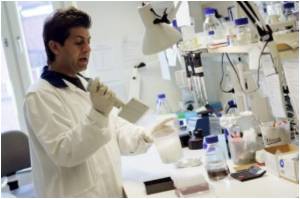A new study published in the open-access journal PLoS Neglected Tropical Diseases on September 6th presents a key advance in developing a safer cure for sleeping sickness.

Researchers at the University of Glasgow combined melarsoprol with cyclodextrins – molecules that surrounded the drug allowing it to be administered orally, increasing its solubility and releasing the drug more slowly in the gut. In laboratory tests the altered drug was shown to retain its ability to kill the infection, and was able to cure mice infected with the parasite after a seven-day daily oral dosing schedule. The drug cleared parasites from the brain and restored normal blood-brain barrier integrity.
According to Prof. Kennedy, "This new research is the most clinically important in the 20 years of our trypanosome research group. It has the potential of a major therapeutic advance and if it is equally effective in humans then it would also have a significant socio-economic impact because the duration of inpatient treatment would be shorter and some patients might even be eventually treated at home."Prof Kennedy added: "You always have to be very cautious when extrapolating results from mouse models to the human disease but there are several reasons why we are quietly optimistic that this may very well work in humans too.
Source-Eurekalert










